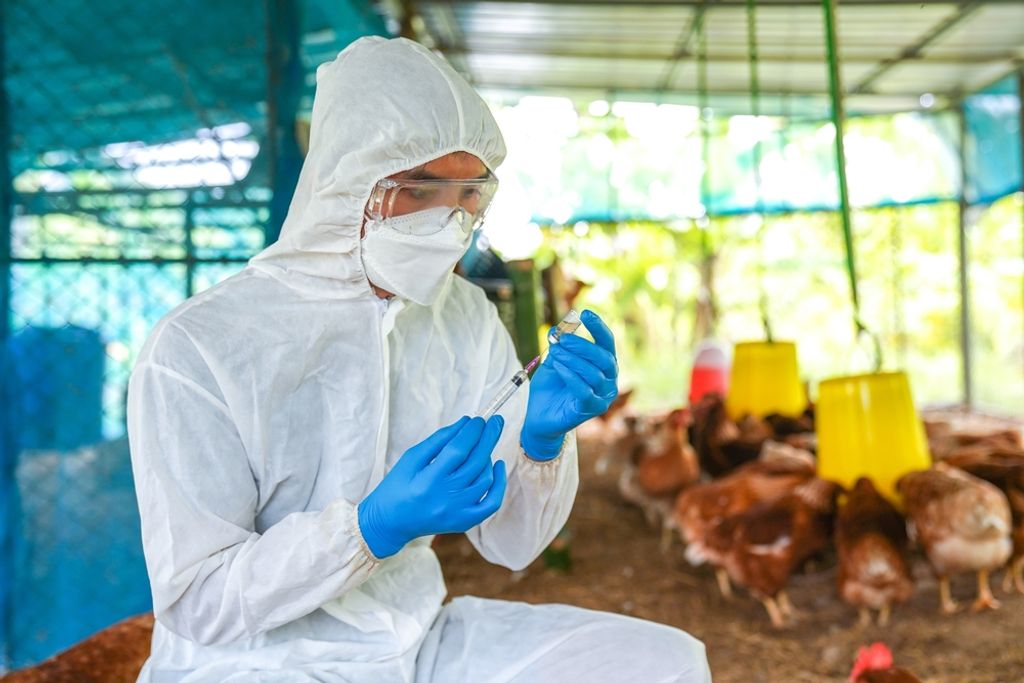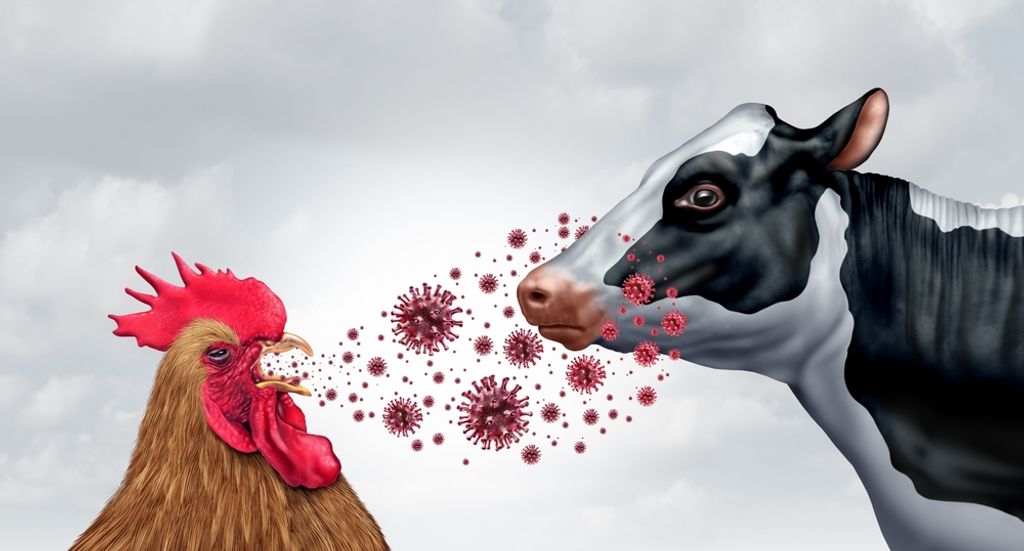The allure of raw milk, with its purported health benefits and natural taste, has led many Americans to embrace it as part of their diet. According to FDA data, approximately 4.4% of Americans consume raw milk at least once a year, and about 1% indulge in its weekly. However, this seemingly wholesome practice carries hidden risks, especially when the milk comes from cows infected with the H5N1 bird flu virus.
The Danger Lurking in Raw Milk
Recent studies have revealed that raw milk from cows infected with H5N1 contains alarmingly high levels of the virus, posing a significant threat to human health. H5N1, or avian influenza, is known for its potential to cause severe respiratory illness and even death in humans. The question arises: Would an H5N1 infection from raw milk manifest like typical influenza, or would its symptoms differ?
H5N1 Infection: What to Expect
Dr. Andrew Pekosz, a professor of molecular microbiology and immunology at Johns Hopkins University, suggests that an H5N1 infection from raw milk would primarily result in a respiratory infection. This assumption is based on observations in other animals that consume H5N1-contaminated milk or infected birds. In these cases, the infection begins in the lungs but can spread to other organs, often leading to the animal’s demise.

Evidence supporting this theory emerged in April when the CDC’s Emerging Infectious Diseases Journal reported a tragic incident on a dairy farm in north Texas. Over half of the 24 domestic cats fed raw milk from sick cows developed systemic influenza infections and died. The cats exhibited symptoms such as nasal discharge, depression, and stiff body movements, indicative of a severe influenza infection.
Clinical Challenges: Diagnosing H5N1
Given these severe symptoms, one might assume that diagnosing H5N1 would be straightforward. However, Dr. Pekosz highlights a significant challenge. While healthcare professionals receive advisories from health authorities like the CDC to be vigilant for potential H5N1 infections, it is not a top concern for most providers. Consequently, cases might initially be overlooked, particularly if the disease is not severe.
 Dr. James Lawler, an infectious diseases expert at the University of Nebraska Medical Center, echoes this concern. He notes that sporadic cases of H5N1 infection from raw milk could easily slip through the cracks of the public health surveillance system. For instance, a young adult presenting with severe pneumonia in the middle of summer might not be tested for influenza, let alone H5N1.
Dr. James Lawler, an infectious diseases expert at the University of Nebraska Medical Center, echoes this concern. He notes that sporadic cases of H5N1 infection from raw milk could easily slip through the cracks of the public health surveillance system. For instance, a young adult presenting with severe pneumonia in the middle of summer might not be tested for influenza, let alone H5N1.
The Broader Implications
 The implications of these findings are far-reaching. While most human cases in the recent cattle outbreak have been linked to large dairy farms, cattle exposed to wild birds could become infected. This risk extends to companion animals that drink H5N1-contaminated raw milk and subsequently interact with humans.
The implications of these findings are far-reaching. While most human cases in the recent cattle outbreak have been linked to large dairy farms, cattle exposed to wild birds could become infected. This risk extends to companion animals that drink H5N1-contaminated raw milk and subsequently interact with humans.
Dr. Lawler emphasizes the responsibility of animal caretakers who sell raw milk to ensure that milk from symptomatic animals is not introduced into the supply chain. However, he acknowledges the difficulty in identifying cows with early, latent, or mild infections, which can still harbor high virus levels in their milk.
A High-Stakes Gamble
Although the likelihood of H5N1 evolving to spread efficiently between humans remains low, the consequences of such an adaptation would be catastrophic. The virus’s ability to bind to bird and human sialic acid receptors in cow mammary glands presents a particularly troubling scenario. This dual binding capability could potentially allow the virus to evolve strains that can more easily infect humans.
Dr. Lawler warns that allowing the virus to persist in cows gives it more opportunities to adapt and pose a greater threat to humans. He expresses disappointment in the lack of urgency from federal and state agencies to address this issue. While current messaging downplays the risk, he argues that the potential consequences of a human-adapted H5N1 strain demand a more proactive approach.
Conclusion: A Call for Vigilance
In conclusion, consuming raw milk from cows infected with H5N1 bird flu presents a serious public health risk. While the probability of the virus mutating to spread efficiently between humans remains low, the potential impact of such an event is devastating. Healthcare providers must remain vigilant; more robust surveillance and preventive measures are essential to mitigate this threat. As Dr. Lawler aptly puts it, relying on hope is insufficient; proactive measures are necessary to protect public health.
Recommendations for Healthcare Providers
- Increase Awareness: Stay informed about potential H5N1 infections and recognize the symptoms, which may mimic or exceed typical influenza severity.
- Enhance Surveillance: Advocate for more comprehensive testing for influenza in patients presenting with severe respiratory symptoms, especially outside the typical flu season.
- Educate Patients: Inform patients about the risks of consuming raw milk, particularly from unknown sources.
- Advocate for Regulation: Support policies that ensure stringent raw milk monitoring and testing before it reaches consumers.
- Stay Updated: Keep abreast of the latest health advisories and research on H5N1 and other emerging infectious diseases.
By adopting these measures, healthcare providers can play a crucial role in identifying and mitigating the risks associated with H5N1 infections, ultimately safeguarding public health.
Disclaimer Statement: This information is from a third-party health news channel. The opinions expressed here belong to the respective authors/entities and do not reflect the views of Docquity. Docquity does not assure, endorse, or vouch for any of the content and bears no responsibility for it in any way. It is essential to take all necessary steps to ensure the information and content provided are accurate, current, and verified. Docquity disclaims any express or implied warranties related to the report and its contents.
References
- Are Doctors Missing Cases of H5N1 Bird Flu in People Who Drink Raw Milk? [Internet]. Accessed on August 05, 2024. Available from: https://www.medpagetoday.com/special-reports/exclusives/111209
- Cow’s Milk Containing Avian Influenza A(H5N1) Virus – Heat Inactivation and Infectivity in Mice. Guan L, Eisfeld AJ, Pattinson D, Gu C, Biswas A, Maemura T, Trifkovic S, Babujee L, Presler R Jr, Dahn R, Halfmann PJ, Barnhardt T, Neumann G, Thompson A, Swinford AK, Dimitrov KM, Poulsen K, Kawaoka Y. N Engl J Med. 2024 May 24. doi: 10.1056/NEJMc2405495.
About Docquity
If you need more confidence and insights to boost careers in healthcare, expanding the network to other healthcare professionals to practice peer-to-peer learning might be the answer. One way to do it is by joining a social platform for healthcare professionals, such as Docquity.
Docquity is an AI-based state-of-the-art private & secure continual learning network of verified doctors, bringing you real-time knowledge from thousands of doctors worldwide. Today, Docquity has over 400,000 doctors spread across six countries in Asia.
Meet experts and trusted peers across Asia where you can safely discuss clinical cases, get up-to-date insights from webinars and research journals, and earn CME/CPD credits through certified courses from Docquity Academy. All with the ease of a mobile app available on Android & iOS platforms!







